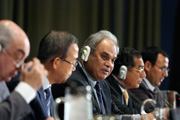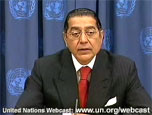 Mr. President, I am pleased to deliver this statement on behalf of the Group of 77 and China. At the outset, I would like to thank the President of the General Assembly for convening this timely and significant High-Level Meeting on sand and dust storms in the context of the International Day of Combating Sand and Dust Storms, and under the Theme of " Working across agendas for resilience and sustainability", to discuss the challenges faced by affected countries and to further practical actions at the regional and global levels. Mr. President, Sand and dust storms are an issue of international concern, the costs of which are measured in economic, social and environmental terms, and that sand and dust storms continue to grow and negatively affect the achievement of 11 of the 17 Sustainable Development Goals and their means of implementation. Sand and dust storms pose a serious challenge to the sustainable development of affected countries and regions. In the past few years, sand and dust storms have inflicted substantial economic, social and environmental damage, especially in Africa and Asia, which underscores the urgent need to promptly take measures to address those challenges. Combating sand and dust storms at all levels requires genuine and effective international cooperation. We underscore the importance of fostering an enabling international economic environment and ensuring the provision of effective means of implementation, including through the elimination of unilateral economic, financial, or trade measures against developing countries, and the expansion of access to technology, capacity-building, and long-term financing. We urge regional, subregional, and interregional organizations and processes to actively strengthen the exchange of best practices, policy approaches, lessons learned, and technical expertise in support of the development and implementation of local, national, regional, and global strategies to combat and prevent sand and dust storms, address their root causes, mitigate their adverse impacts, and promote sustainable and long-term solutions. We welcome the efforts of the United Nations Coalition on Combating Sand and Dust Storms to promote and coordinate a collaborative United Nations system response to the growing issue of sand and dust storms on a local, national, regional and global scale, ensuring that unified and coherent action is taken, and to facilitate the capacity-building of affected countries, raise their awareness and enhance their preparedness and response to sand and dust storms in critical regions. We strongly urge that the United Nations Coalition on Combating Sand and Dust Storms to implement, as a matter of urgency, the activities identified by its five working groups, namely knowledge-sharing, capacity-building, training, awareness-raising, and support for the formulation of national, regional and interregional plans, to mitigate and prevent sand and dust storm hazards; further encourages the Coalition to intensify resource-mobilization efforts, and invites the Coalition to consider broadening the scope of its concept note to encompass other sectors affected by sand and dust storms, thereby ensuring full alignment with the Coalition's workplan. The Group 77 and China also believes that the current rotational format for the coalition's chairmanship hinders the long-term effectiveness of the United Nations system in addressing sand and dust storms. We once again reiterate our request to the Secretary-General to designate a relevant agency or entity with adequate capacity, by July 2025, to act as a focal point on sand and dust storms in the United Nations system to follow up the decisions in the relevant resolutions and the United Nations Coalition on Combating Sand and Dust Storms. We also value the efforts of ESCAP and ESCWA in their capacities as the current co-chairs of the Coalition and commend their commitment to advancing coordinated action on combating sand and dust storms. Mr. President, Despite the escalating risks posed by sand and dust storms at regional and global levels, the international response remains insufficient, and the level of investment continues to fall short of what is required. It is imperative that SDS be elevated as a matter of global priority. This calls for strengthened political will, the integration of SDS into national and global development agendas, scaled-up resource mobilization, enhanced capacity-building efforts, and the promotion of sustainable international cooperation. I thank you for your attention. Mr. President, I have the honor to deliver this closing statement on behalf of the Group of 77 and China. We begin by once again extending our sincerest appreciation to the Government and people of the Kingdom of Spain for hosting this historic Fourth International Conference on Financing for Development. We are deeply grateful for the generous hospitality and excellent arrangements provided throughout the days of the conference, which have contributed to a conducive environment for dialogue and engagement. Mr. President, The Group of 77 and China recognizes that progress has been achieved. Compromise outcomes have been secured in a number of key areas of financing for development, particularly those of priority to developing countries. We acknowledge the important elements included in the outcome document that contribute to closing the financing gap, supporting the reform of the international financial architecture, and reinforcing commitments towards the achievement of development goals, including the implementation of the 2030 Agenda and its SDGs. We are pleased to note the explicit recognition of the USD 4 trillion financing gap, and the call for concrete, urgent action to mobilize additional, innovative, adequate, affordable, predictable, and accessible financing for developing countries. We welcome the inclusion of language referencing the principle of Common but Differentiated Responsibilities, as enshrined in the Rio Declaration, along with the reaffirmation of the right to development. These are foundational principles that must continue to guide global efforts on financing for development. The document further strengthens the importance of national ownership and international cooperation in domestic resource mobilization, especially in the area of international tax cooperation. We appreciate the acknowledgment of the realities faced by countries in special situations, and the reaffirmation of national sovereignty in fiscal policymaking. The Group welcomes the recognition of the need to mobilize private resources at scale and speed, the steps to support MSMEs through reviews of regulatory frameworks, and the call to scale up FDI in developing countries in accordance with national investment priorities. The acknowledgment of the developmental role of remittances, while reaffirming that they are not substitutes for ODA and FDI, is also valued. The support for domestic capital market development through innovative and thematic instruments, project pipeline building, and guarantees through MDBs to catalyze private finance are also notable achievements. We welcome the commitments to increase grants in ODA, and the reaffirmation of the UN's central and coordinating role in international development cooperation, along with the commitment to revitalize the Development Cooperation Forum. This requires reinvigorating the development cooperation architecture that honors country ownership and leadership, with a strong focus on results, inclusive partnerships, transparency, and mutual accountability, recognizing the complementary roles of all actors at all levels. We also acknowledge the flexibility shown by the Group in referencing the OECD-DAC review process, and emphasize that UN Member States must be updated on its outcomes and be allowed to provide feedback for transparently. The Group supports the call to refrain from unilateral coercive measures that are in breach of international law and the Charter of the United Nations, which hinder economic and social development, particularly in developing countries. However, there remain a number of issues of principle that are important to, and fully endorsed by, the Group that have not been adequately accommodated in the current text. Among them is the regrettable omission of the commitment to "leave no country or person behind," which is a foundational principle under the FfD framework; the exclusion of references to non-tariff measures and the negative developmental impact of environmentally motivated unilateral trade measures; the removal of language inviting ECOSOC to examine the impact of unilateral measures; the omission of an explicit reference to the CBDR-RC as a guiding principle of climate action; and the omission of our proposed language on updating, improving and reforming outdated investment agreement reform that hinder progress on the SDGs. We continue to call for meaningful reform of international financial institutions and regret the limited progress made in addressing the asymmetries that persist in global economic governance. While we recognize the adoption of the Compromiso de Sevilla as a modest step in the right direction, we need more political will to consider concrete proposals such as annual SDR allocations and the creation of a multilateral swap line for developing countries in times of crisis. We also note the progress made on language related to financial regulation, particularly with regard to credit rating agencies, and expect the forthcoming report on risk weightings to be presented at the ECOSOC to stimulate further discussion and action on removing regulatory barriers to investment and access to financing in developing countries. We commend the recognition of the role of science, technology, and innovation in addressing financing and digital divides, including by advocating for stronger national innovation systems and leveraging the potential of digital financial services. We welcome the call for stronger international cooperation on STI, and reiterate that this must include scaled-up finance and capacity-building for developing countries. In conclusion, while the Group of 77 and China is pleased to join the consensus on this outcome document, we recognizes it as an important first step forward, and therefore we call for its full, effective, timely, and balanced implementation. The deliverables must be translated into concrete action on the ground, and our collective efforts must continue to strengthen the financing for development agenda in support of developing countries. Thank you. Mr. Chair, I have the honour to deliver this statement on behalf of the Group of 77 and China. The Group notes that, in comparison to the Addis Ababa Action Agenda, the chapter on domestic and international private business and finance of the Compromiso de Sevilla has concrete calls to action. In particular, in paragraph 33 a-f, we see a clear goal of increasing foreign direct investment in developing countries to support national development priorities and the SDGs, including through: - targeted investment mechanisms for SIDS, LDCs, LLDC, and MICs; The challenge is for the private sector to heed this call and truly increase their investments in developing countries at the needed scale and speed. The cost of capital is much too high for developing countries, reducing competitiveness and integration of MSMEs in regional and global value chains. Addressing international systemic issues is critical moving forward to give life to these commitments. We need to reduce the risk perception of investing the Global South by reassessing the methodology of credit ratings agencies and looking at the impacts of prudential frameworks, such as Basel III, on lending to enterprises in developing countries. Investing in the development of those most in need can produce long-term returns for the entire world community. We note that private sector resources are needed to help fill the sustainable development financing gap; but they cannot replace the role of ODA. Therefore, the mobilization of private resources through blended financing holds potential, to catalyze and crowd-in more private resources for sustainable development. These mechanisms must be country-driven and take into account national circumstances. We do not want standards and classifications that will further burden developing countries. The role of MDBs in the provision of guarantees and first-loss capital is essential and must be scaled up. We want to see more long-term quality investments in portfolios, rather than one-off projects. This may inspire the private sector to also see themselves as stewards for sustainable development. The follow-up of FFD4 can seek to track the volume and areas in which private finance contributes to the SDGs, in pursuit of the objectives of the Compromiso de Sevilla. We emphasize the positive contribution of migrants to sustainable development, and the importance of remittances and the need to further reduce their costs; in no way should remittances substitute ODA or FDI. Financial access and literacy is key, at local, national and international levels to ensure no country and no one is left behind. Thank you. 31st Annual Meeting of Ministers for Foreign Affairs (27 September 2007)
Press Briefing by G-77 Chairman at the 41st G-77 Chapters Meeting (26-27 February 2007)
Press Conference by G-77 Chairman on G-77 Agenda and UN Reform (20 February 2007)
|
|||||||

 Print
Print
 RealPlayer
RealPlayer


